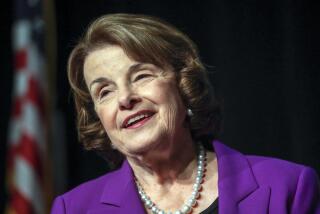Feinstein in familiar role as she scolds Obama over NSA scandal
- Share via
SAN FRANCISCO -- Early in her U.S. Senate tenure, when she was chewing through staff like a rototiller, Dianne Feinstein offered one of the least apologetic, most self-aware comments of her many decades in public life.
“I don’t get ulcers,” she said. “I give them.”
With controversy flaring anew over the National Security Agency and its regimen of eavesdropping on friend and foe alike, President Obama is just the latest to experience the stomach-acid-inducing ire of California’s scolding senator.
Feinstein has been one of the NSA’s strongest defenders and one of Obama’s staunchest allies in the debate over where to draw the line on sanctioned snooping. But when news broke of U.S. spying on world leaders and the country’s supposed allies, she let loose. “It is my understanding that President Obama was not aware Chancellor [Angela] Merkel’s communications were being collected since 2002,” said Feinstein, chair of the Senate Intelligence Committee, referring to Germany’s leader. “That is a big problem.”
Feinstein’s admonishment reverberated for many reasons, not least because it came from a member of Obama’s own Democratic Party, a rare break in Washington’s increasingly regimented partisan ranks.
PHOTOS: 2013’s memorable political moments
But it was hardly unusual for Feinstein, who was a regular tormentor of the last Democrat to serve in the White House, Bill Clinton. She held out until the last minute before supporting his 1993 economic program, the linchpin of Clinton’s first term and a spark for the job creation he still brags about. She withdrew as a cosponsor of Clinton’s ill-fated 1994 healthcare plan, and routinely made the White House squirm for her support when other Democrats marched in lockstep.
“Difficult,” was the word one Clinton administration insider used, reflecting a view Feinstein that was something less than a steady friend. “A royal pain.”
Relations grew even more fraught during Clinton’s second term.
Feinstein was seated prominently in the front row, among Democrats summoned to the White House as supportive props, when the embattled president famously -- and fatuously -- wagged his finger and claimed, “I did not have sexual relations with that woman,” a reference to his intern-paramour, Monica S. Lewinsky.
When the truth surfaced, Feinstein steamed at the betrayal. Unlike other Democrats, though, she went public with her outrage. After Clinton acknowledged his “inappropriate relationship” with Lewinsky, Feinstein was among the first to upbraid him, charging onto the Senate floor to say her confidence had been “shattered.”
Later, however, Feinstein played a key role in negotiating the bipartisan bargain that saved his presidency when the Senate voted to censure and not oust Clinton.
That fits a pattern. By now, at age 80 and the oldest member of the U.S. Senate -- a fact she would thank you to disregard -- Feinstein has grown used to the role of odd woman out.
In the strange taxonomy of San Francisco politics (where left is center and left-of-center would have a person committed in other places), she is viewed as a buttoned-down conservative. As mayor, Feinstein routinely fought with neighborhood activists over downtown development and battled the politically potent gay community over closing the city’s bathhouses to fight the spread of AIDS.
She marked her first headline appearance at a state Democratic Party convention more than 20 years ago by thumbing her nose at liberals and drawing a shower of boos for embracing the death penalty.
In the Senate, after giving Clinton fits, she discomfited Obama by poor-mouthing the prospects of healthcare reform and unsettled fellow Democrats by pushing gun control -- a personal passion -- when they preferred she wouldn’t.
“I think people expect me to do what I think is the right thing,” Feinstein said in a 2009 interview, just before Obama took office. “I’ve been here now for 16 years, and there’s no sense in staying if I can’t express my view, if I just have to go along.”
In the end, though, Feinstein has usually fallen in line with fellow Democrats, as she did with impeachment and support for Obama’s healthcare plan.
But not without a certain amount of cliff-hanging drama.
And not before creating a few more ulcers.
Twitter: @markzbarabak
More to Read
Get the L.A. Times Politics newsletter
Deeply reported insights into legislation, politics and policy from Sacramento, Washington and beyond. In your inbox three times per week.
You may occasionally receive promotional content from the Los Angeles Times.











